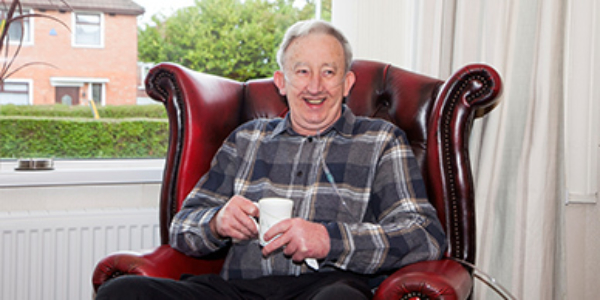
NI Chest Heart and Stroke is calling on the Executive to work with it to help stop a possible ‘tsunami of sickness.’ The charity has found that because of COVID-19, many people with chest, heart and stroke conditions have been missing out on vital health care and regular outdoor exercise since March. We believe this will lead to significant increase in illness in the coming months.
Our concern is based on feedback received from the more than 20,000 support calls we have made to people with long-term conditions during the coronavirus crisis. 98% said the support made them feel less lonely and isolated, while 95% felt less anxious. 92% said it helped them keep physically active.
Evidence from many people we support suggests that they are living in almost complete isolation.
Ivan Black (67) from Belfast has a serious lung condition. He said: “Before COVID-19, I exercised in the gym and met other people living with respiratory conditions at my local NICHS Breathing Better Group. I’ve got to the stage now that I don’t like leaving the garden and people are afraid to come and visit in case they pass on the virus. My world has got so much smaller and my health is deteriorating. Less than a year ago, I was able to walk around the Stormont Estate, but these days I’m lucky if I have the strength to walk to the garden gate. Since March I’ve also avoided calling the doctor unless I feel it’s serious because I know they’re busy and I don’t want to be a burden or cause a fuss.”
NICHS is making this plea to the Executive as it launches its new campaign, ‘Still Caring through COVID’. The campaign, which is supported by MACE, a long-term charity partner, aims to draw attention to the fact that our services – re-designed to take account of restrictions - are still supporting people across Northern Ireland, despite the virus. But the authorities need to engage with and invest in the charity so services in the community can be scaled up to help people stay well and manage their chest, heart and stroke conditions throughout the duration of the COVID-19 pandemic.
Neil Johnston, Public Affairs Manager at NICHS, said: “We are concerned that with so much focus on telling people to isolate and a significant period where access to normal health services has been restricted by COVID-19, the country might be facing a tsunami of sickness in the next few months as a result. The situation could become critical as we face winter flu pressures and rising waiting lists, which include more than 200 people already waiting more than a year for their first appointment with a cardiologist. The health and social care system need to act now to do more to help those with existing conditions who have been living isolated and restricted lives in recent months. Now, more than ever, the NI Executive must work with partners in the voluntary sector and fund an expansion of community support.
“Despite the obvious huge reduction in fund raising during the pandemic, we have continued to provide a range of vital services to our most vulnerable individuals and communities through COVID-19. However, further funding is essential to ensure community services can be provided throughout all parts in NI.
“At the moment, we only get 50% of the cost of stroke services we provide on behalf of the government, and nothing for respiratory services. These respiratory services alone cost us £250,000 a year and save the Health Service £650,000. Elsewhere in the UK, these services receive better than 100% government funding. We’ve also set up a COVID-19 Recovery Service to meet an increasing need, again with only the support of public donations. It is vital that government addresses this under investment and works with us to meet the challenges ahead.”
Ivan Black, who uses a portable oxygen cylinder for his lung condition, said: “Having NICHS help at the end of the phone is so important and has helped me to keep fighting, but I need to get out to increase my exercise levels. Walking round the garden just isn’t enough. My health isn’t good now. I try to keep going, but I’m so tired. My wife Margaret and I know that living in fear is no way to live, but we understand that we live in extraordinary times and we’re not the only ones who are feeling trapped in their house. The longer this goes on, however, the more the fear sets in and the more I’m scared of everyone.”
